Eight reasons to read the Financial Times this weekend
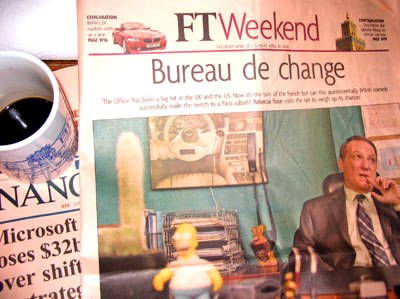
Through some freak accident of globalization, a pink newspaper from England has arrived in America to save us from lazy, rote writing.
After 300 years with no real competition, our Yankee newspapers forgot how to serve readers. Their advertising grew just 1 percent last year compared with 30 percent for Web sites.
Our British savior, the Financial Times, shows how to win back yuppies and hipsters who fled newspapers for the Web. The secret: pay attention to how readers feel, not to the publisher's pocketbook and writers' egos.
The Financial Times has the best weekend newspaper in the country -- trim and energetic where the New York Times Sunday is bloated and obvious; breezy where the nascent Wall Street Journal Weekend Edition is buttoned-down.
You should read Weekend FT because:

Reflection trumps reporting. The New York Times and Wall Street Journal pack their weekend newspapers with news, trend, spending guide, reviews or political opinion -- a busy reflection of the workweek's noisy hustle.
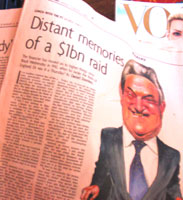 FT shifts gears for the weekend, publishing relaxed and thoughtful features that reflect a spirit of play. For example, FT editors think it smashing to: FT shifts gears for the weekend, publishing relaxed and thoughtful features that reflect a spirit of play. For example, FT editors think it smashing to:
- Take a smart fellow to lunch, ply him with booze and write it up for the paper. Such an interview wanders and darts, more like a conversation between two old friends than a typical rushed newspaper interview.
- Hire an economist to weigh in on everyday matters like cafe prices, dieting and applying retail tricks to dating. This fresh and analytic content is fun.
- Invite a news writer into the opinion section to write his true thoughts about one of the people he covers. Opinion on news supercedes the actual reporting of news, a logical shift for the weekend.
Reading these plodding articles would be infuriating on Tuesday morning, while hurtling toward the office on the subway. But on the weekend one wants the writer to sound like she was stretched out in her pajamas in the sunroom, a glass of wine at her side.
Changing tone to match the mood of one's audience is how the Web and TV succeed in the news game. Examples include the witty Ze Frank on the Web and Jon Stewart and cuddly Bill O'Reilly on TV.

Fresh writing on fresh topics. Since Weekend FT emphasizes analysis and writer whim, its articles are especially diverse, and its voice has quite a range.
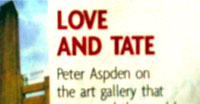 One writer backed into a piece on synthetic meat by writing about his traditional weekend "morning fry" of sausage and eggs. One writer backed into a piece on synthetic meat by writing about his traditional weekend "morning fry" of sausage and eggs.
Another told of his trials organizing a picnic for friends, and then wandered into writing about "food fascists" who cannot be pleased.
Topics range from design to economic development to wine.

It is not homework. On the weekend, the Wall Street Journal too often reads like homework.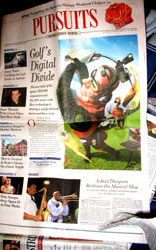
Recent stories in its "Pursuits" section were on
- pricey golf gear,
- jazz woes in New Orleans,
- workout clothes,
- office attire
- and garage cleaning. Garage cleaning.
These are topics one traditionally hopes to avoid on the weekend.

Tyler. The incomprable Tyler. Which brings us to the hero of our story, columnist Tyler Brule.
The name must be fake. (Anne and I have decided my FT Weekend name is "Connor Fraiche.")
The look, from the photo attached to his column, is corporate George Michael -- shadow beard, melodramatic eyes.
The lifestyle is jet-setting corporate executive, no wife, no children, healthy interest in one's own pleasure. (Unhealthy lack of interest in limits of one's expense account.)
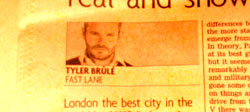 The tone is imperious, spoiled, worldly, prescriptive. The tone is imperious, spoiled, worldly, prescriptive. It must be read regularly to be believed. And it is, I must admit, the most addictive corner of the newspaper, particularly if read aloud in a smarmy British accent.
In one episode, Tyler's flight leaves him stranded in Tokyo with his business "companion." He teaches us a lesson in making the best of things with the right booze and the right hotel room.
Another time, Tyler makes for the reader a shopping list for summer holiday in Zurich, including Loro Piana swim trunks and "Marimekko canvas tote bag in chocolate brown."
There's also the one in which Tyler fantasizes about purchasing a military hydrofoil from a Scandinavian country. (I wish I were joking.)
 It does not waste your time.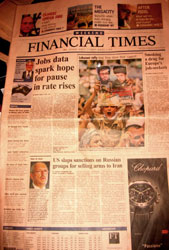 Economic writer David Warsh has called FT stories "lapidary," or gem-like. Nearly all stories fill only one rectangular bit of paper -- no "jumping" to another page. Economic writer David Warsh has called FT stories "lapidary," or gem-like. Nearly all stories fill only one rectangular bit of paper -- no "jumping" to another page.
Compare this with the New York Times, an inexcusably massive weekend paper which on Sunday told us that:
- People on road trips sometimes fight about audiobook selection.
- Wine Spectator's ratings impact wine sales.
- AOL's release of customer search records raises privacy concerns.
This is a waste of trees. The Sunday New York Times is larger than a whole stack of FTs.
 The food section.Despite being smaller than either the New York Times Sunday or Wall Street Journal Weekend Edition, the FT has the most expansive food section.
Across two full pages and four regular columns, FT imparts bites of wisdom (har har) rather than mere coverage.
Take my favorite FT article, a Philippa Davenport column on chickens: how long they should live (at least 84 days, compared with 54 for the average free-range bird), how they should be plucked (by hand, since machines require scalding the carcass) and how long they should be hung (week or more, though most are never aged).
Did you know more mature chickens develop a layer of fat under their skin, making them especially delicious?
 An international perspective.There is far more non-American news in the FT than in the Wall Street Journal or New York Times, as one would expect from a British newspaper published throughout the world.
International news has become more relevant with economic globalization and the War on Terror. And if you are going to be reading news at all on the weekend, wouldn't you prefer it be about events far away?
 'At the weekend,' 'pensions reform,' 'labour,' 'on holiday,' etc.Reading in the Queen's English makes you special. Just ask any Economist subscriber!
|

